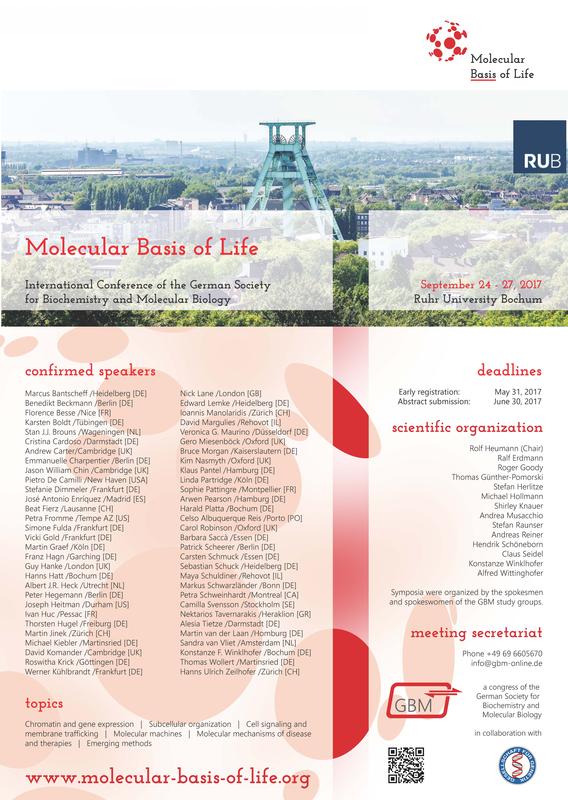Call for Abstracts – The Molecular Basis of Life

GBM Conference "Molecular Basis of Life" GBM
With this congress, GBM will bring together a wide range of researchers from Germany and from across the globe to explore ‘The Molecular Basis of Life’. The congress will cover the entire spectrum of molecular biosciences with symposia on
• Chromatin and Gene Expression
• Cell Signaling and Membrane Trafficking
• Subcellular Organization
• Molecular Machines
• Molecular Mechanisms of Disease and Therapies
• Emerging Methods
In addition, there will be sessions on research in the bioscience industry, spectroscopic methods and biomarkers, career development and education as well as activities tailored specifically for scientists in the early stages of their careers.
Oral presentations from selected abstracts will provide a forum especially for young scientists within each session and as part of selected short talks and will be chaired by leaders in the field.
Abstract submission:
We kindly request the active participation of young researchers by submitting scientific contributions by June 30, 2017 at http://www.molecular-basis-of-life.org
Important deadlines:
Early registration: May 31, 2017
Abstract submission: June 30, 2017
For further information please visit the conference website http://www.molecular-basis-of-life.org.
http://www.molecular-basis-of-life.org conference website
http://www.gbm-online.de website of the German Society for Biochemistry and Molecular Biology (GBM)
Media Contact
All latest news from the category: Event News
Newest articles

Sea slugs inspire highly stretchable biomedical sensor
USC Viterbi School of Engineering researcher Hangbo Zhao presents findings on highly stretchable and customizable microneedles for application in fields including neuroscience, tissue engineering, and wearable bioelectronics. The revolution in…

Twisting and binding matter waves with photons in a cavity
Precisely measuring the energy states of individual atoms has been a historical challenge for physicists due to atomic recoil. When an atom interacts with a photon, the atom “recoils” in…

Nanotubes, nanoparticles, and antibodies detect tiny amounts of fentanyl
New sensor is six orders of magnitude more sensitive than the next best thing. A research team at Pitt led by Alexander Star, a chemistry professor in the Kenneth P. Dietrich…





















